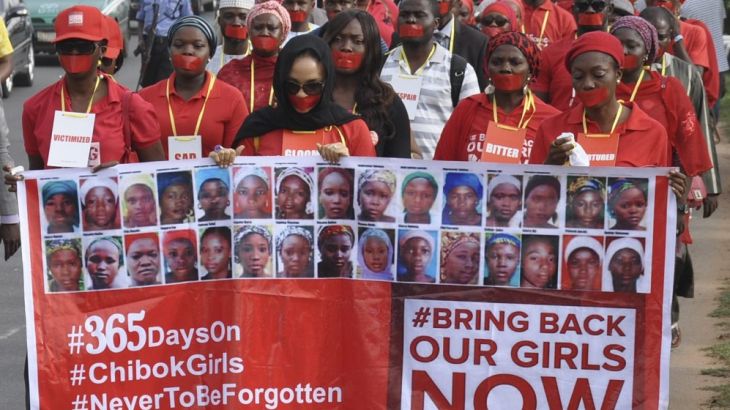Nigeria protesters demand action on Chibok abductions
Girls and women march in Abuja, urging government to rescue more than 200 students kidnapped by Boko Haram a year ago.

Protesters have gathered in the Nigerian capital to demand that their government take action to rescue the more than 200 girls abducted a year ago from their school in northeastern town of Chibok.
Girls and young women, wearing red shirts and carrying signs, chanted solidarity songs as they marched on Tuesday to the ministry of education office in Abuja.
The signs that they carried bear numbers and the names of the students who disappeared a year ago following an attack by the armed group Boko Haram.
“The idea is to send a message to the government that these girls must be found,” Al Jazeera’s Yvonne Ndege said, reporting from Abuja.
“The government’s position is that they are doing all they can to find the Chibok girls. But they have faced extraordinary challenges because of the insecurity in the northeast.”
Boko Haram opposes Western education and has sought to impose Islamic law in all 36 states of Nigeria, which is roughly equally divided between a predominantly Muslim north and a mainly Christian south.
The group operates mainly in the northeastern Nigerian states of Adamawa, Borno and Yobe, where the government has declared a state of emergency since May 2013.
In the city of Lagos, the sombre anniversary was being marked by some of the nation’s most prominent voices, including Africa’s first-ever winner of the Nobel Prize for Literature, Wole Soyinka.
“We should join hands…to make sure that such an assault on our humanity does not happen again,” Soyinka said at a ceremony in Nigeria’s economic capital.
‘Deep commitment’
Mike Omeri, a spokesman of for the outgoing Nigerian President Goodluck Jonathan, told Al Jazeera the government has “not forgotten” those who were abducted.
“There’s a deep commitment on the part of the government and also the citizens of this country that the girls taken from Chibok are rescued,” he said, adding that the area where the schoolgirls were kidnapped has been retaken by the government.
“A lot of efforts have been made to encourage parents to tell their children to go back to school,” Omeri said.
On Tuesday, the rights group Amnesty International reported that at least 2,000 women had been abducted by Boko Haram in 2014 and that many of them were being forced into sexual slavery.
Boko Haram fighters stormed the Government Secondary School in Chibok on the evening of April 14 last year, seizing 276 girls who were preparing for end-of-year exams.
Fifty-seven escaped soon afterwards. Boko Haram leader Abubakar Shekau has since said the remainder have all converted to Islam and been “married off”.
The mass abduction brought the brutality of the insurgency unprecedented worldwide attention and prompted a social media campaign demanding the schoolgirls’ immediate release.
Nigeria’s government was criticised for its initial response to the crisis and forced into accepting foreign help in the rescue effort after a groundswell of global outrage.